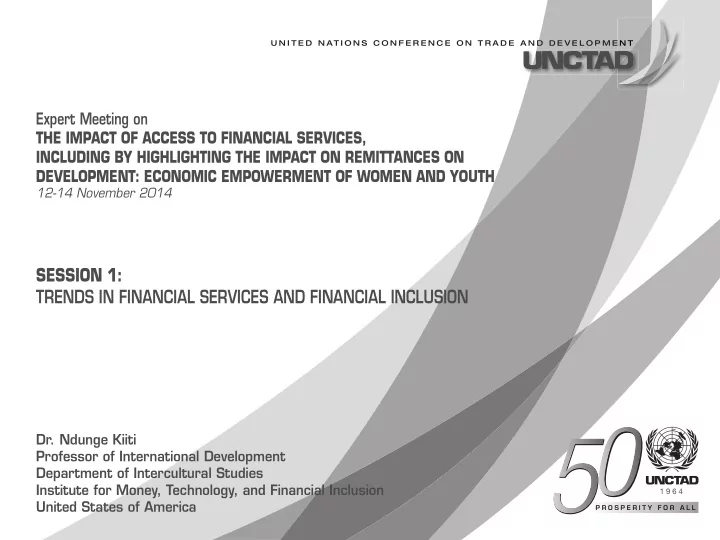

� � � � � � � � U N I T E D N A T I O N S C O N F E R E N C E O N T R A D E A N D D E V E L O P M E N T U N I T E D N A T I O N S C O N F E R E N C E O N T R A D E A N D D E V E L O P M E N T Expert Meeting on THE IMPACT OF ACCESS TO FINANCIAL SERVICES, INCLUDING BY HIGHLIGHTING THE IMPACT ON REMITTANCES ON DEVELOPMENT: ECONOMIC EMPOWERMENT OF WOMEN AND YOUTH 12-14 November 2014 SESSION 1: TRENDS IN FINANCIAL SERVICES AND FINANCIAL INCLUSION 5 0 Dr. Ndunge Kiiti Professor of International Development Department of Intercultural Studies Institute for Money, Technology, and Financial Inclusion 1 9 6 4 United States of America P R O S P E R I T Y F O R A L L 5 0
Dr. Ndunge Kiiti (Houghton College, NY) and Dr. Jane Mutinda (Kenyatta University, Kenya) United Nations Conference on Trade and Development Research funded by Institute for Money, Technology and Financial Inclusion (IMTFI) November 12, 2014
Global: 650 million to 1 billion people with disabilities (UN International Telecommunication Union-ITU, 2010 & WHO) Workforce: 386 million of the world's working-age people have a disability (International Labor Organization-ILO) o Unemployment among persons with disabilities is as high as 80% in some countries (ILO) Education: 5 per cent of all published works in accessible formats for persons with visual impairment (UN World Intellectual Property Organization — WIPO, 2010)
• Women’s Groups • Persons with Visual Impairment Research • Informal Sector or ‘ Jua Kali’ (Ongoing) Projects • Capacity Building of Researchers • Diverse/Global-Gender is a Theme Approach • Field Based Methodology — Mixed Methods • Dissemination/Lessons Learned • Policy and Program Implications Impact
Natural Economic Socio-Cultural Political/Legal Environmental Health Resources *Practice Financial *Policy Inclusion Outcome: Well-Being
Disability: “A physical, sensory, mental, or other impairment including any visual, hearing, learning or physical incapacity which impacts adversely on social, economic or environmental participation” (Persons with Disabilities Act, 2003) Visual Impairment: The loss of vision which, even after correction, adversely affects a person’s performance or execution of typical everyday tasks (Murugami, 2010) o Includes blindness
National: 331,593 people with visual impairment in 2009 (Kenya Union of the Blind, 2009) Gender: 55% females; 45% males (Kenya Union of the Blind, 2009) Education: 79% of children with visual impairment not attending school — females most affected (Ministry of Education, 2009) o Literacy rates are low: global literacy rates among persons with disabilities are estimated at 3% for adults; 1% among women (UNDP)
Poverty-Health Link o Poverty as a cause or consequence of poor health — e.g. blindness (Kuper, Polack, et al, 2008) o Childhood blindness correlated with socio- economic development (Njuguna, Msukwa, et al, 2009) Poverty-Visual Impairment Link o Study in three countries highlights relationship (Kuper, Polack, et al, 2008) o Study confirms M-PESA services tend to benefit individuals of higher, socio-economic status (Mbiti & Weil, 2010)
Oppor ortunit tunities ies Challen llenges/Ob ges/Obsta stacles cles Quality of Life/Livelihoods Poverty Cycle Integration/Inclusion Isolation/Stigma Security Fraud/Distrust Independence/Privacy Dependency Technology Affordability/Access Ability/Diversity Burden/Inability Education/Training Illiteracy Resources (Policy) Lack of Commitment Relevant Initiatives Lack of Data/Evidence
“ Poverty and Visual Impairment are brothers ” (Interviewee, personal communication, 2012)
“ “We are only impaired, not disabled” (Interviewee, personal communication, 2012) “We are people with special abilities” (Interviewee, personal communication, 2012)
“Mobile Banking is supposed to work for everyone, so it is paramount to provide access of these resources” (Member Organization working with VIs, 2012)
“Access to Information is a Human Right — but VIs aren’t able to access” (Interviewee, personal communication, 2012)
Technology as Interdisciplinary Approach o “products, resources, methodologies, strategies, practices and services…to promote functionality for visually impaired people with regard to autonomy, independence, quality of life, and social inclusion” (Alves, Monteiro, Rabello, et al, 2009, p. 148) Technology must be undergirded by training and support services (Resnikoff, Pascolinini, et al, 2004)
Selected d Internatio ernational nal Frame meworks ks Selected d Natio ional nal Frame amewor orks ks UN Convention on the The Constitution of Kenya Rights of Persons with State of Disabled People’s Disabilities — 2006 Rights in Kenya — 2007 (Autonomy, Dignity, Equality, Inclusion, Respect of Difference) The Persons with Africa Decade of Persons Disabilities Act — 2003 with Disabilities Vision 2030 International Labor National Development Plan Organization (ILO) Convention
“A person with any disability is entitled to access….appropriate means of communication…. materials and devices to overcome constraints arising from the person’s disability” (Constitution of Kenya, 2010, p. 63)
Define Determinants: Multi-Sectoral Partnerships Education o Sensitization of Society (VI in mainstream language) o Formal (e.g. Curriculum, Assessment) Improve Data/Information System of VIs Appropriate Products and Services o “The needs of people with impairments are not addressed by the market; a phenomenon that tends to be repeated with each new product and technology (Vanderheiden as cited in Pedlow, et al, 2010, p. 133) Accessibility (e.g. Cost, Training, Gender, Security)
“Every day, millions of people around the world who have a disability, are faced with frustrating — even impossible- situations…..these people should enjoy the same services and opportunities in life as everyone else” (ITU as cited in Pedlow, Kasnitz & Shuttleworth, 2010, p. 147)
Book Chapter in ’ Money at the Margins: Global Perspectives on Technology, Inclusion & Design’ by IMTFI (Forthcoming) Institute for Money, Technology and Financial Inclusion (IMTFI) o Email: imtfi@uci.edu | Website: imtfi.uci.edu Contact: Dr. Ndunge Kiiti o Email: Ndunge.Kiiti@houghton.edu o Video: http://www.youtube.com/watch?v=BMt18nxctEc&feature=youtu. be
Recommend
More recommend